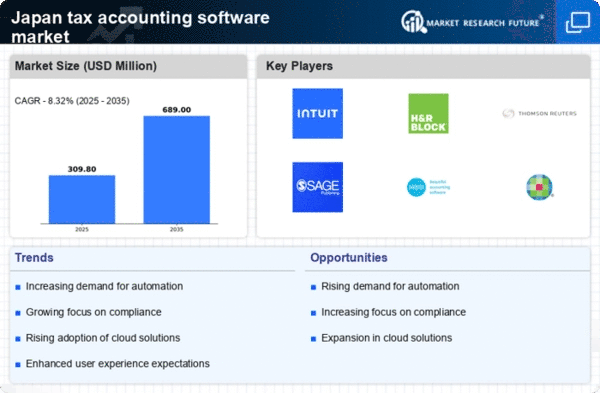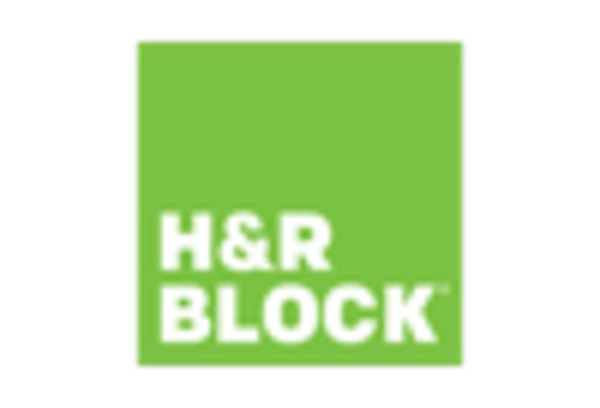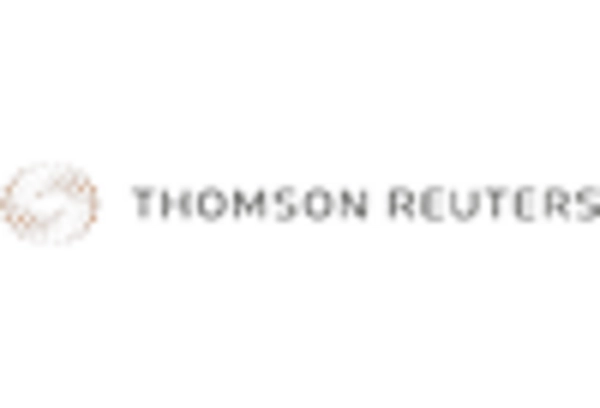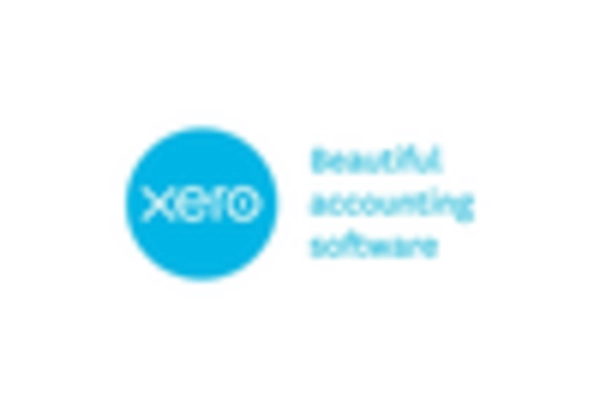The tax accounting-software market in Japan is characterized by a competitive landscape that is increasingly shaped by technological advancements and evolving consumer expectations. Key players such as Intuit (US), H&R Block (US), and Thomson Reuters (US) are actively pursuing strategies that emphasize innovation and digital transformation. Intuit (US), for instance, has focused on enhancing its cloud-based solutions, which allows for seamless integration and real-time data access, thereby catering to the growing demand for efficiency among businesses. H&R Block (US) has also made strides in expanding its service offerings through strategic partnerships, which not only enhance its market presence but also diversify its product portfolio. Collectively, these strategies indicate a shift towards a more integrated and user-centric approach within the competitive environment.
In terms of business tactics, companies are increasingly localizing their offerings to better meet the specific needs of Japanese consumers. This localization often involves adapting software features to comply with local tax regulations and cultural preferences. The market structure appears moderately fragmented, with several players vying for market share, yet the influence of major companies remains substantial. The collective actions of these key players contribute to a dynamic competitive atmosphere, where innovation and customer service are paramount.
In October 2025, Intuit (US) announced a significant upgrade to its TurboTax software, incorporating advanced AI features that streamline the tax filing process. This move is strategically important as it positions Intuit (US) at the forefront of technological innovation, potentially attracting a broader customer base that values efficiency and accuracy in tax preparation. Furthermore, the integration of AI could enhance user experience, thereby fostering customer loyalty in a competitive market.
In September 2025, H&R Block (US) launched a new partnership with a leading fintech company to offer integrated financial planning tools alongside its tax services. This strategic alliance is noteworthy as it not only expands H&R Block's service offerings but also aligns with the growing trend of providing holistic financial solutions. By integrating tax services with financial planning, H&R Block (US) is likely to enhance its value proposition, appealing to consumers seeking comprehensive financial management.
In August 2025, Thomson Reuters (US) unveiled a new cloud-based platform designed specifically for small to medium-sized enterprises (SMEs) in Japan. This initiative is significant as it addresses the unique challenges faced by SMEs in tax compliance, thereby positioning Thomson Reuters (US) as a key player in this segment. The focus on SMEs reflects a broader trend towards catering to niche markets, which may yield substantial growth opportunities in the future.
As of November 2025, the competitive trends within the tax accounting-software market are increasingly defined by digitalization, sustainability, and the integration of AI technologies. Strategic alliances are becoming more prevalent, as companies recognize the value of collaboration in enhancing their service offerings. Looking ahead, it appears that competitive differentiation will increasingly hinge on innovation and technological advancements rather than solely on price. This shift suggests that companies will need to invest in reliable supply chains and cutting-edge technology to maintain a competitive edge in a rapidly evolving market.

















Leave a Comment